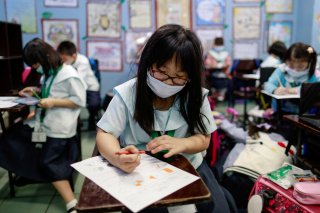
Sens. Tom Cotton (R-Ark.) and Marsha Blackburn (R-Tenn.) have proposed a bill to ban Chinese nationals from receiving U.S. student visas for science, technology, engineering and mathematics research.
The Trump administration has been cracking down on researchers with links to China as U.S. authorities accuse China of industrial espionage. Cotton and Blackburn’s bill, introduced on Wednesday, would ban Chinese researchers in certain fields from the United States altogether.
“Beijing exploits student and research visas to steal science, technology, engineering and manufacturing secrets from U.S. academic and research institutions,” Blackburn said in a statement. “We’ve fed China’s innovation drought with American ingenuity and taxpayer dollars for too long.”
Cotton has previously railed against the presence of Chinese students in American science, technology, engineering and mathematics (STEM) programs. He told Fox News last month that Chinese students should only be allowed “to come here and study Shakespeare and the Federalist Papers.”
“That’s what they need to learn from America,” Cotton said. “They don’t need to learn quantum computing and artificial intelligence from America.”
Sen. Rick Scott (R-Fla.) had proposed his own bill last week to freeze student visas to Chinese nationals until federal agencies can conduct a “thorough national security evaluation and clearance” of Chinese students already in the United States.
Cotton and Blackburn’s bill ups the ante, banning these visas indefinitely for STEM students.
It would also expand the definition of espionage to include China’s alleged technology theft.
The proposed bill does not apply to students from Hong Kong and Taiwan, both of which are treated separately from mainland China under U.S. law, as well as members of “religious or ethnic groups systematically oppressed by” China’s ruling Communist Party.
The crackdown on technology transfer reflects long-standing Republican concerns about competition with China.
“For decades now, China has bent, and abused, and broken the rules of the international economic system to its own benefit,” Sen. Josh Hawley (R-Mo.) said in a Senate floor speech last week. “They have stolen our intellectual property and forced our companies to transfer sensitive trade secrets and technology.”
Lawmakers on the other side of the aisle are also concerned with industrial espionage but tend to see foreign students as an asset rather than a liability to the United States.
Four leading Democrats proposed their own bill on Wednesday to create a national Technology Directorate, which would invest $100 billion in advanced research and development over the next five years.
Rep. Ro Khanna (D-Calif.), one of the lawmakers who introduced the bill, had written an essay on technological competition in May 2019, arguing that “America’s tradition of welcoming immigrants gives us an advantage over Chinese insularity.”
“Taxpayers spend approximately 70 billion dollars in higher education each year. Why turn away brilliant minds who benefit from this investment and want to build their companies in America?” Khanna wrote. “We should staple green cards to our international STEM graduates’ diplomas.”


No comments:
Post a Comment